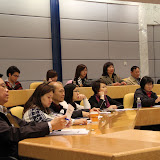Hong Kong Panel Study of Social Dynamics: Initial Data
CASER is happy to announce that our first wave main survey of HKPSSD (Hong Kong Panel Study of Social Dynamics) has launched and is welcomed by the public. Dozen of phone calls are received every day from our selected households and make appointments to inquiry about the survey. Our interviewers are visiting the households and doing fieldwork intensively. The inital data are being transferred successfully to our server on 13 April in the early morining.
香港社會動態追蹤調查:數據上傳
中本心很高興地為大家宣佈,我們的《香港社會動態追蹤調查》已順利展開,亦受到大眾認同。自調查開始以來,許多獲選住戶已陸續致電到本中心進行電話預約及查詢有關內容。我們的訪問員亦會密鑼緊鼓地造訪各個住戶,而首個樣本數據已於四月十三日上午成功上傳到伺服器。
Hong Kong Panel Study of Social Dynamics: Completion of Interviewers’ Training
 |
| HKPSSD Main Study Training |
IAS Distinguished Lecture Series: "Trade and Poverty: When the Third World Fell Behind" by Prof. Jeffrey Williamson
It was our honor to have Professor Jeffrey Williamson given a public lecture on “Trade and Poverty: When the Third World Fell Behind” in our sixth lecture of the IAS Distinguished Lecture Series on Inequality and Poverty held on 22 March 2011 (Tue) at the Hong Kong University of Science and Technology.
Prof. WIlliamson is the Laird Bell Professor of Economics, emeritus, Harvard University and Honorary Fellow, Department of Economics, University of Wisconsin-Madison. He received his MA and PhD from Stanford University in 1961, was on the University of Wisconsin-Madison faculty (1963-1983) and the Harvard University faculty (1983-2008). He is the author of about twenty five books and almost two hundred scholarly articles in economic history, international economics and economic development, Prof Williamson has served as President of the Economic History Association (1994-1995), Chairman of the Harvard Economics Department (1997-2000), and Master of Mather House at Harvard University (1986-1993). He has had visiting appointments at more than fifteen foreign universities and long associations with the World Bank, the International Monetary Fund and the Inter-American Development Bank.
Abstract:
This lecture reports the findings of the speaker's new book of the same title (MIT Press 2011). It asks whether and how global trade forces helped account for the enormous rise in the per capita GDP gap between rich core countries in western Europe and their offshoots, and the poor periphery in Asia, Africa, Latin America and the backward European periphery. It offers lessons for the 21st century.